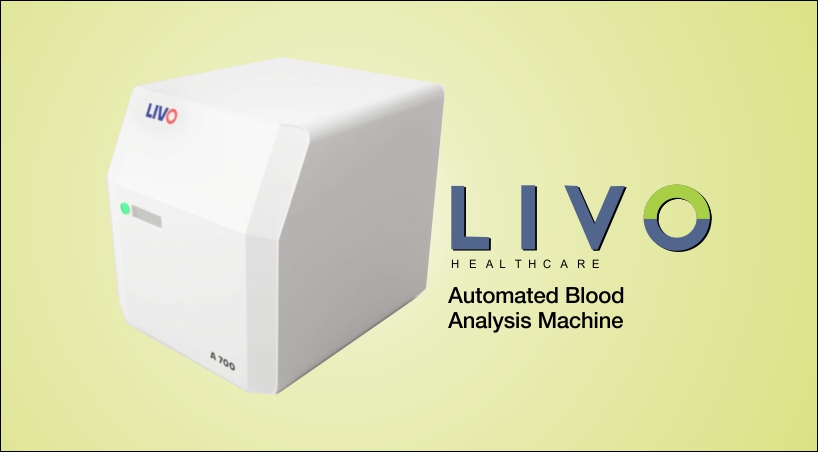Hyderabad Startup reduces Blood test time to minutes instead of Days

In India, blood test results require a long and tedious wait, and situations tend to get worse when the results need a speedy treatment. It is one of the primary tests which doctors suggest in case of any sickness or disease, the pandemic has highlighted this issue three-fold in today’s world where blood test gives a complete picture of the patient’s health which is done by conducting the CBP analysis, renal diseases, malaria, dengue and chikungunya among others. It is only after the blood test that the doctor finds himself in a position to proceed with the treatment. In the traditional way, CBP report takes about a day whereas RT-PCR test for diseases like Covid-19 consumes around 48 hours, although there has been a sea change in the way medical system functions, less change has been seen in the way blood test is done, it is still old fashioned. While talking about the situation, medical devices startup Livo cofounder Dr. Junaid Shaik said that there are about 2 Lakh diagnostic centers/hematology labs and 20-25K pathologists in India and a majority of them are still using conventional blood analysis devices that are time-consuming. Plus, the usage of reagents in the process limits the devices to test more samples, he added, which was highlighted severely during the ongoing Covid-19 crisis.
Hyderabad-based Livo came out with a solution for the problem and developed a blood analyzer device that will not only provide the data of the blood count and eliminates the usage of reagents, but will, in addition, it gives out the morphology report of the cell. Doctors now can identify abnormalities in the cell structure and also find out whether any cell is cancerous with the help 3D morphology report. Shaik said that Livo’s blood analysis device will be quick and it will enable the completion of the entire process of collecting the sample to reporting in just about six minutes, which is the much lesser time taken then what it used to take to prepare a slide with the sample in the conventional process.
Normally, a blood count done by flow cytometry gives out data of red blood cells (RBC), white blood cells (WBC), hemoglobin, platelets count. And based on the count, doctors will be able to diagnose illness and suggest medical treatments. Semi-automating the entire process, Livo cuts down on the time taken. “In the process, we realized that our blood smear and strainer itself is quite unique, nothing like in the Indian market” emphasized Shaik
In order to collect the blood sample, a device Blood smear is brought to use, which can be smeared on the microscope slide with a push of a button. On the other hand, a Blood strainer is used for filtering the sample, where the blood smear slide is placed in a coplin jar with modified Wright-Giemsa stain for one minute, also-known-as custom rapid strain in the case of Livo. It is to be noted that the same device can also be used as a pap smear, to test for certain kinds of cancer such as cervical cancer, which is very much common among Indian women, Shaik added.
Accuracy, Accessibility & Affordability
Accuracy plays a very vital role when it comes to medical analysis devices, and it is also the biggest challenge faced. In terms of accuracy as per the company reports, it said that it leverages artificial intelligence and machine learning tools to scan thousands of microscopic images to provide accurate results. Livo claimed to have run clinical trials on 300 patients/cases and said that its reports are 97% accurate, and all its devices are CE and ISO 13485:2016 certified. In terms of the new medical device directives, the company said that it has also applied for In Vitro Diagnostic Regulation (IVDR), which will be effective from May 26, 2022, onwards. In addition to this, it also has a no-objection certificate (NOC) from Central Drugs Standard Control Organisation (CDSCO), a new rule under India’s medical device rules (MDR) 2017, which has classified such devices as unregulated devices. When it comes to accessibility Livo assures that its devices are easy to use and can it can be easily accessible across remote locations, particularly in Tier 3, Tier 4 and Tier 5 cities/towns as it has built the technology capabilities within the device. Coming to the point of affordability, Livo’s blood smearer and strainer are available at a price of INR 1.3 Lakh, it has also come up with a rental model where diagnostic centers, labs, and clinics can rent its devices for INR 2-2.5K per month. “If you want to purchase blood smearer and strainer in the Indian market, the cheapest ones cost about 2.5 Lakh, and we have reduced the cost by almost 50%,” informed Shaik.
Livo said that it plans to charge from the customers only the manufacturing cost of the device, as it aims to keep the device pocket friendly, with the volume of the business, it looks forward to earn MoM recurring revenue from the subscription. The company made it clear, that all its devices manufactured are done locally (in partnership with local CNC vendors) and are assembled in-house. The company was founded in 2018 by Dr. Junaid Shaik, Faisal Sheikh, and Prof. Prasanth Kumar. Livo for the last few years has been in the process of product development. The business has been doing fairly well, which can be understood by the fact that it has received 25 preorders and has recently closed a distribution deal of 800 devices from southern Indian states, including Telangana, Tamil Nadu, Karnataka, Kerala and Andra Pradesh. The company is backed by health tech-focussed angel investors and industrialists such as Ravi Reddy, Dr. Praveen Kumar, and others, it has raised a total of $366K in funding, with most recent financing round at 100 Cr valuation.
Livo faces competition in the market with Sight Diagnostics, Cellavision, Roche, 1Drop Diagnostics, Arivale among others. As per the report from MarketWatch, the global POC infectious disease diagnostics market will go up to 1.05 Bn by 2026, from $997.7 Mn in 2020, which will trigger a compound annual growth rate of 5.4%.
Livo in an interview said that it currently positions itself differently in terms of its zero reagents, low cost, and on-site digital morphology report, compared to other competitors in the space, where their devices are expensive and time-consuming.
Testing In The Times Of Covid-19
The company planned to launch its products (blood smearer, stainer, and scanner) into the market by April. But, a disruption in the supply chain owing to the Covid-19 pandemic had made the company postpone its launch to the second week of August, and its operations also came to a halt.
The pandemic times saw the company utilizing its resources effectively on its upcoming products, a pathology scanner called A700. The device does more than just scan the sample and produce digital reports, said Shaik, fascinatingly.
He further added that this new device has the capability to share and send digital slides over to remote pathologists via the cloud. “We have developed a platform, which follows a neat workflow and ensures the entire process is smooth. Also, we have used machine learning tools, which stitches thousands of images and detects abnormal cells and raises a red flag immediately,” Shaik said, adding that this will greatly enhance the accuracy of the report provide easy access to pathologists, general physicians, and gynecologists.
The pricing for Livo’s new device came up to INR 3 Lakh, which as per the founder was one of the USPs. “Again, the cheapest scanner in the market would cost about INR 6-9 Lakh, excluding other features that come with our device,” added Shaik.
The company is functioning in its pre-revenue stage, in the days to come, Livo said that it will be partnering with two of India’s biggest strainer and smearer manufacturers in the country to further boost its production capacity. Also, the company will be collaborating with IIIT Hyderabad, and Basavatarakam Indo American Cancer Hospital & Research Institute for research and development work added the founder.“In the coming months, we will be coming up with multiple use cases, including semen analysis, histopath, breast cancer, liver cancer, oral cancer cell detection, etc. This is all the starting point for us. In fact, we are already working on cervical cancer, and in the coming days, we will start working on breast cancer.”



